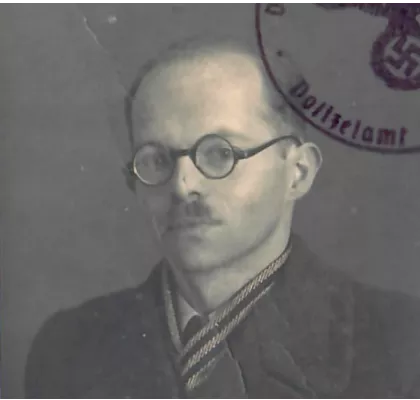Karel Rutar (1917-1966)
The foreman
- © Centropa
- © Centropa
Karel Rutar was the foreman of the carpenters in Wulkow. We gathered information about him from the very personal written exchanges with his young wife Hana during their time in the camps. Many of the letters, cards and leaflets have been preserved and were donated to the Jewish Museum in Prague. They wrote in German and often only using a pencil.
Born in Prague on 04 April 1917, Karel Rutar was one of the younger prisoners in the camp. Nothing is known about his life before his time in Theresienstadt. He was already married to Hana (Hanka) when they arrived in the Theresienstadt ghetto on 04 December 1941. Many couples got married before deportation so that they could stay together. They lived at Hauptstraße 1/41. In early April 1942, Ludmila happened to meet the young couple, who were visiting her flatmate. Karel was working as a carpenter, and in the spring of 1943 was already involved in the construction of barracks. From 21 August, he worked in the "Bauschowitzer Kessel". His experience was probably the reason he was made foreman of the carpenters in Wulkow. Like Ludmila, Hanka worked in "agriculture". The women therefore were acquaintances. After Karel left for Wulkow, Ludmila lost contact with him.
- © United States Holocaust Memorial Museum Collection. From the Centropa Archive
Karel Rutar wrote to his Hanka from Wulkow as often as he could. The letters and cards provide information about Karel's life and the work in the barracks. He was always concerned about Hanka's life in Theresienstadt. He also regularly received short messages and greetings from Hanka, her family, former colleagues and friends from Theresienstadt. The messages were often about Karel's equipment and work materials in Wulkow - there was talk of work suits or even a file for sharpening saw blades! There were many complaints from the Theresienstadt prisoners about the lack of mail from Wulkow. Correspondence was strictly regulated.
As a foreman, Karel probably had a few privileges - for example, he was allowed to write longer letters. Some even included sketches by Leo Haas. At times, his descriptions of the camp conditions read as overly optimistic. On the other hand, Karel suffered for the "misdemeanours" of his "subordinates" under the violent whims of camp commandant Franz Stuschka. Ludmila told of a brutal punishment: Stuschka made him stand naked outside at night and in winter and poured cold water over him. Karel lost his hearing in his left ear as a result of a severe slap.
After the war, Karel Rutar returned to Prague. The young Rutars' first marriage did not last and they divorced at the beginning of 1946. Karel struggled with the separation from Hanka. He organised a dowry and even provided her with a trousseau.
In the same year, Karel and Ludmila met each other again, became better acquainted and soon married. They moved into his flat in Vršovice together. Their daughter Iva was born in 1947 and their son Josef in 1949. Karel initially worked for the Milk and Fat Association, later assigned to the Ministry of Food Industry, and then as an employee for the Orionka chocolate brand.
On 13 May 1966, Karel Rutar died of leukaemia in Prague at the age of just 49. Ludmila raised the children on her own. After her brother emigrated to the USA in 1968, she suffered professional harassment in the socialist ČSSR.
- © Centropa
From 05 April, one day after his 27th birthday, until 10 April 1944, Karel wrote a five-page letter with a fountain pen:
„My dearest Hanka" I have gratefully received all your letters and the 8 cards. They gave me great joy. The main thing is that my Hanka is healthy and has everything she needs. It is raining now. I have 2 hours off. Now I'm washed, but I have to postpone shaving if I want to write to you. But shaving once a week is enough. I have to make the most of this peace and quiet." ... "Food is very good. Every evening something is made from pâté or a whole pâté. Today for lunch, for example, pearl barley with pâté (hash). In the evening ½ pâté and soup." ... "I spent yesterday's birthday very badly. Nothing went right and I was very annoyed with people. For tomorrow I wish you, my wife, the very best, that you are happy with your husband, that he returns to you soon and then never leaves you. And I wish the same from you, that you will always be a good and obedient wife who will always love me.“
Letter from Hanka to Karel Rutar, 07 April 1944:
„My dearest Kajušku! Once again we have the opportunity to write to you, but we have had no news from you for 14 days, which worries me greatly. Hopefully we will receive mail in the meantime. Zlotiško, are you well? Do you have enough to eat? Please tell me the truth, you know that I would very much like to send you what you need. Even if you need underwear, shoes, socks, or anything at all, please write to me immediately, because I can send it to you. But you would have to write down exactly what you need. Promise me, Zlato, that you will write if you need anything. I just had a bath and Mrs Feigl is here now. At six thirty o'clock I am going with [Franta Smolka] to "The Magic Flute". I had hoped that you would go with me, but I hope that it won't be long now and my darling will be with me.“

